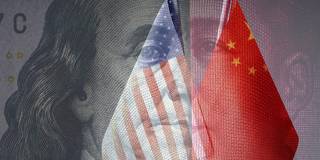China's decision to demolish the "one country, two systems" arrangement in Hong Kong appears to be a fait accompli, and in fact seems to have been preordained. Viewed in a broader context, the move represents a major salvo in a new cold war that is already playing out across three critical dimensions.
SEOUL – In retrospect, the decision by the Communist Party of China (CPC) to impose a new security law on Hong Kong seems to have been preordained. Historically, rising powers always try to expand their spheres of geopolitical influence once they pass a certain stage of economic development. It was only a matter of time before China would do away with the “one country, two systems” arrangement and impose its laws and norms on Hong Kong – a territory that it considers integral to the motherland.
From China’s perspective, America’s decadence and decline over the last 12 years – from the 2008 financial crisis to Donald Trump’s presidency – have given it an open invitation to accelerate its strategic expansion. Though Chinese President Xi Jinping has long assured the world that the Pacific Ocean is big enough to accommodate both China and the United States, his actual policies have often suggested otherwise. In addition to militarizing the South China Sea, his signature Belt and Road Initiative aims to make China the nodal point for the entire Eurasian landmass.
Now that Xi has decided to accept nothing less than Hong Kong’s full subservience, he will likely also challenge the status quo with respect to Taiwan, trusting that an isolationist, distracted Trump administration will do nothing. But the US has taken note of Xi’s aggressiveness. After two decades of hoping that China would become a responsible stakeholder in the world economy, US policymakers have finally decided that this will not happen. Since the CPC’s March 2018 decision to abolish presidential term limits, the US foreign-policy establishment has abandoned any expectation of normative convergence between Xi’s China and the West.

SEOUL – In retrospect, the decision by the Communist Party of China (CPC) to impose a new security law on Hong Kong seems to have been preordained. Historically, rising powers always try to expand their spheres of geopolitical influence once they pass a certain stage of economic development. It was only a matter of time before China would do away with the “one country, two systems” arrangement and impose its laws and norms on Hong Kong – a territory that it considers integral to the motherland.
From China’s perspective, America’s decadence and decline over the last 12 years – from the 2008 financial crisis to Donald Trump’s presidency – have given it an open invitation to accelerate its strategic expansion. Though Chinese President Xi Jinping has long assured the world that the Pacific Ocean is big enough to accommodate both China and the United States, his actual policies have often suggested otherwise. In addition to militarizing the South China Sea, his signature Belt and Road Initiative aims to make China the nodal point for the entire Eurasian landmass.
Now that Xi has decided to accept nothing less than Hong Kong’s full subservience, he will likely also challenge the status quo with respect to Taiwan, trusting that an isolationist, distracted Trump administration will do nothing. But the US has taken note of Xi’s aggressiveness. After two decades of hoping that China would become a responsible stakeholder in the world economy, US policymakers have finally decided that this will not happen. Since the CPC’s March 2018 decision to abolish presidential term limits, the US foreign-policy establishment has abandoned any expectation of normative convergence between Xi’s China and the West.